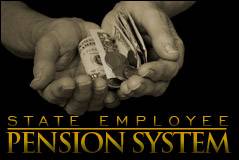Media
The Only Way to Fix Public Pensions
 The Baltimore Sun editorializes that the only way to fix the pension plan for state workers (in Maryland, though the same would hold true in Pennsylvania) is to move away from the traditional, defined-benefit pension to a defined-contribution retirement — like a 401(k).
The Baltimore Sun editorializes that the only way to fix the pension plan for state workers (in Maryland, though the same would hold true in Pennsylvania) is to move away from the traditional, defined-benefit pension to a defined-contribution retirement — like a 401(k).
Maryland already offers state employees and others covered under the retirement system a 401(k) or the equivalent, but participation is modest. Currently, there is no state contribution or “match,” so the only incentive is an opportunity to make a supplemental, tax-shielded investment — often described as the third leg of state employees’ three-legged stool of retirement income that includes pension and Social Security benefits.
But as legs go, the state’s supplemental retirement system is looking rickety. One solution to increase participation would be to offer employees a choice — put far more of their own pay checks into the pension fund to maintain existing benefits, or have an equivalent sum put in their 401(k) and freeze their pension payout. Defined contribution programs would, at least, offer the advantage of being fully portable and not requiring years to vest . . .
Public employees may prefer the state-guaranteed pensions of the past — and, to be fair, most aren’t getting rich off current benefits, no matter how unaffordable they’ve become to the rest of us. That may not sound appealing to those who have devoted their lives to government service, but it’s an unavoidable reality. If Maryland’s system is to be fixed, defined contribution plans are going to have to play a far larger role in the future.
Stateline also offers a story on how pension reform is a major issue facing state lawmakers, and the 2010 elections:
GOP candidates for governor in California, Minnesota, Illinois, Oregon, New York, Rhode Island, Michigan, Maine and Nevada have embraced the change from defined benefits, with their promise of a guaranteed monthly retirement check, to defined contributions, in which workers and (to a lesser extent) the state government pay into a non-guaranteed savings account that the employee draws from upon retiring.The contrast between Republicans and Democrats reflects a fundamental political reality: Public employee labor unions, which want to preserve defined benefit plans, usually provide money and campaign workers to Democrats.